Civil Rights Movement Teaching Resources
Bring the civil rights movement to life in your social studies classroom with printable worksheets, timeline activities and more teaching resources created by teachers for teachers like you
The Teach Starter team of teachers has curated a special collection of social studies resources that offer students an understanding of the important people, places and events from this point in United States history. Find printable and digital curriculum-aligned social studies resources about Dr. Martin Luther King Jr., Ruby Bridges and more important figures from the American Civil Rights era.
New to this sector of the social studies curriculum? Read on for a primer from our social studies teacher team, including a definition of civil rights that you can add to your lesson planning, plus a look at some of the most important civil rights leaders from American history.
What Are Civil Rights? A Kid-Friendly Definition
Before you can dive deep into the biggest moments in the history of the civil rights movement in America or even teach students about the most important civil rights activists, it helps to define what civil rights really are.
Here's a definition our social studies teachers use with our own students:
Civil rights are the basic human rights and freedoms that every person is entitled to — no matter what race, gender or religion they are.
What Is the Civil Rights Movement? A Kid-Friendly Way to Explain the Move for Social Change
Moving on to the movement itself, how do you explain the concept to your students? Give this a try:
The civil rights movement was a social movement in the United States that emerged in the mid-1950s and aimed to end racial discrimination and segregation against African Americans.
Among the movement's best known and most impactful figures were Martin Luther King Jr., Malcolm X, and Rosa Parks, brave Black activists who employed a variety of tactics to effect change in America from peaceful protests and civil disobedience to legal challenges in the court system.
The movement led to the passage of key federal legislation, including the Civil Rights Act of 1964 and the Voting Rights Act of 1965, which helped to end segregation and discrimination and ensured voting rights for Black Americans.
The Civil Rights Movement is also important for its impact beyond the Black community — it led to the rise of other movements for minority rights and equality such as women's rights, LGBTQ rights, and many more.
Who Were the Leaders of the Civil Rights Movement?
Introducing your students to the human stories of the various leaders of the civil rights movement can be a powerful means of helping kids understand that this movement was truly driven by people and their desire for change. Some of those leaders that you might want to use in your teaching include:
- Martin Luther King Jr. — A Baptist minister and civil rights activist, Dr. King played a key role in the American civil rights movement from the mid-1950s until his assassination in 1968. He is best known for his role in the advancement of civil rights using nonviolent civil disobedience.
- Malcolm X — A Muslim minister and human rights activist, Malcolm X was a vocal critic of the civil rights movement's emphasis on nonviolence. He was assassinated in 1965.
- Rosa Parks — This Black civil rights activist is best known for her refusal to give up her seat on a bus in Montgomery, Alabama, in 1955. This simple act of defiance sparked the Montgomery Bus Boycott and helped to launch the modern civil rights movement.
- Medgar Evers — This Black civil rights activist worked for voting rights and desegregation in Mississippi. Like many other figures in the movement, Evers was assassinated. His killer, a member of the Ku Klux Klan, remained free for many years after his 1963 murder due to deadlocked all-white juries.
- James Meredith — Meredith was the first Black student to attend the University of Mississippi in 1962 and is known for leading the 1966 “March Against Fear” from Memphis to Jackson in protest of violence that Black people faced while exercising their right to vote.
- Fannie Lou Hamer — An American voting rights activist and civil rights leader, Hamer was the co-founder of the Mississippi Freedom Democratic Party, which she represented at the 1964 Democratic National Convention.
- John Lewis — This civil rights leader and a member of the "big six" leaders during the civil rights movement, Lewis became a member of the United States House of Representatives from Georgia.
Why Is It Important to Teach About the Civil Rights Movement?
The civil rights movement is an important part of American history and understanding its events, leaders, and impact is essential for elementary school students as they form an understanding of the current social and political landscape of the United States.
The movement challenged the institutionalized racism and discrimination that had long been present in American society, and its successes and failures continue to shape our society today. Studying the civil rights movement in your social studies classes can provide valuable lessons on the power of grassroots activism, the role of the government in promoting social change, and the importance of standing up for what is right, even in the face of adversity.
When we teach our students about the Civil Rights Movement, they're also gaining an understanding of how this grassroots movement helped shape the current laws and policies in the United States and the world and how it has set an example of how the marginalized groups and minorities can fight for their rights and equality.
- Plus Plan
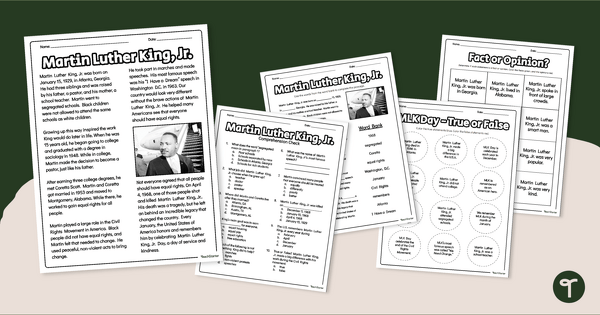
Martin Luther King, Jr. Reading Activity Pack
Apply a range of reading comprehension strategies to learn about Martin Luther King, Jr.
- Plus Plan
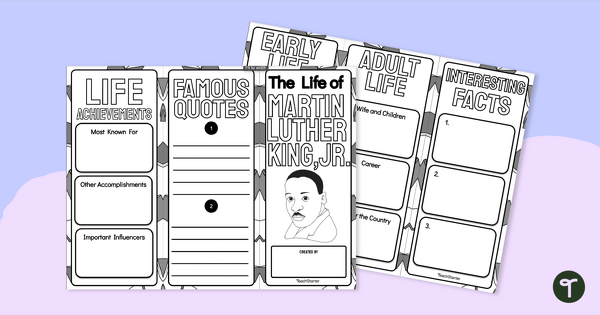
Martin Luther King, Jr. Trifold Brochure
Demonstrate learning about the Martin Luther King’s contributions to the Civil Rights Movement with a brochure project.
- Plus Plan
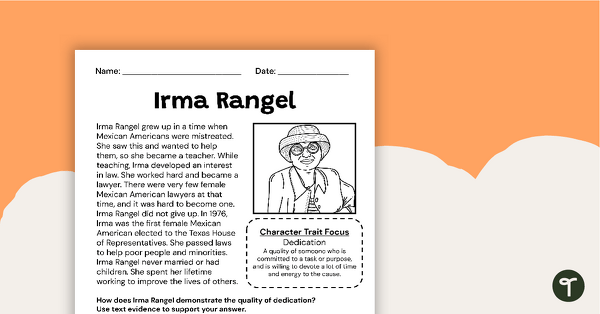
Irma Rangel Constructed Response Worksheet
Use this Irma Rangel worksheet and writing prompt to help students write a paragraph using text evidence.
- Plus Plan
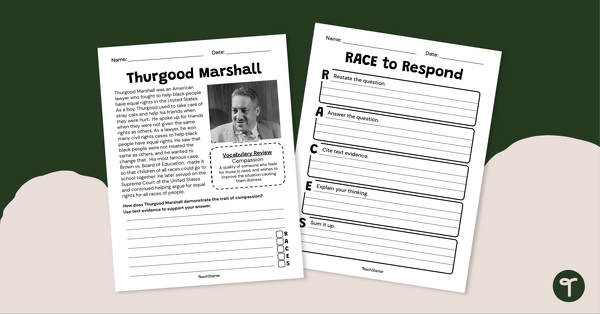
Thurgood Marshall Constructed Response Worksheet
Discover the influence and positive character traits of Thurgood Marshall with a reading passage and RACES writing prompt for fourth grade.
- Free Plan
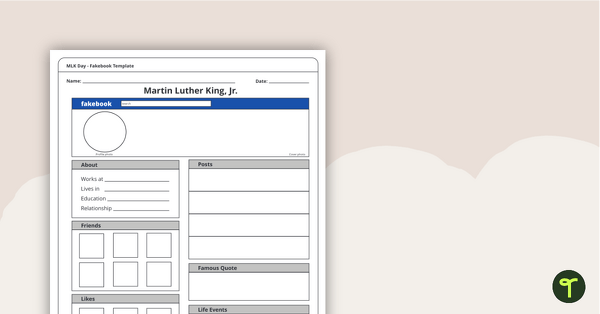
Martin Luther King, Jr.'s Fakebook Worksheet
Design a social media profile for civil rights activist Martin Luther King, Jr. in this creative writing activity.
- Plus Plan
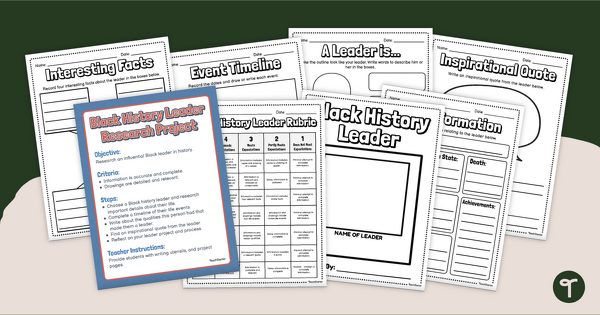
Influential Black Leaders - Research Project
Help your students learn about and recognize some of the most influential Black leaders in history with Black History Month Research Project.
- Plus Plan
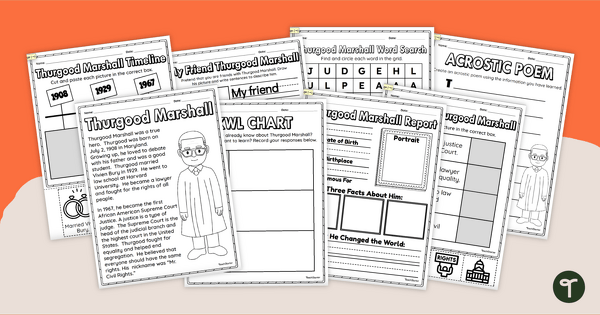
Thurgood Marshall Activity Pack
Learn about the life and contributions of Thurgood Marshall with a comprehensive pack of informational worksheets.
- Plus Plan
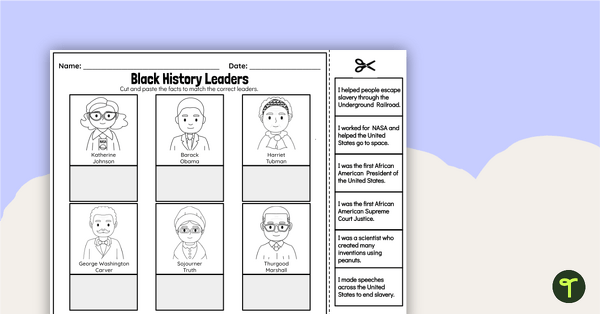
Black Leaders in History - Cut and Paste Worksheet
Dive into learning about influential black history leaders with a cut-and-paste worksheet.
- Plus Plan
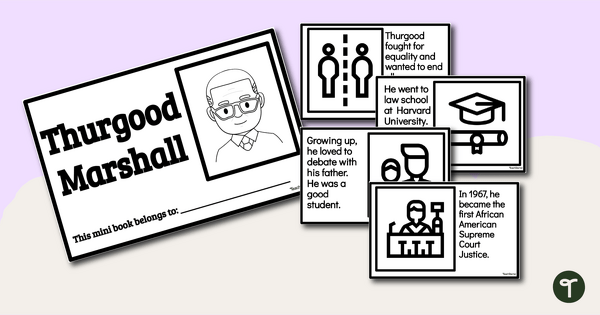
Thurgood Marshall Mini Book
Discover the accomplishments of Thurgood Marshall with a printable mini-book.
- Plus Plan
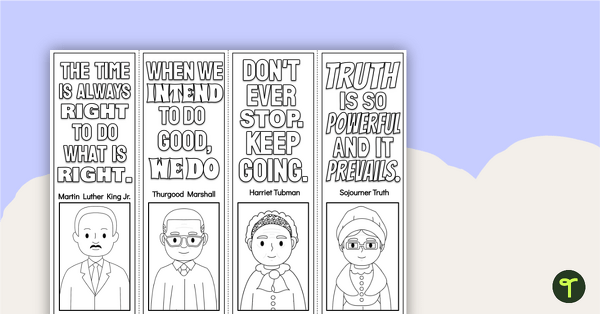
Black History Month Quotes - Printable Bookmarks
Bring calm to the classroom and celebrate Black History Month with a set of printable bookmarks to color.
- Plus Plan
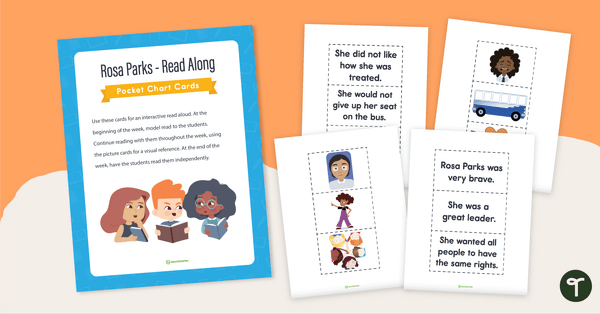
Read Along Pocket Chart Cards - Rosa Parks
Read and learn about Rosa Parks with printable pocket chart cards.
- Plus Plan
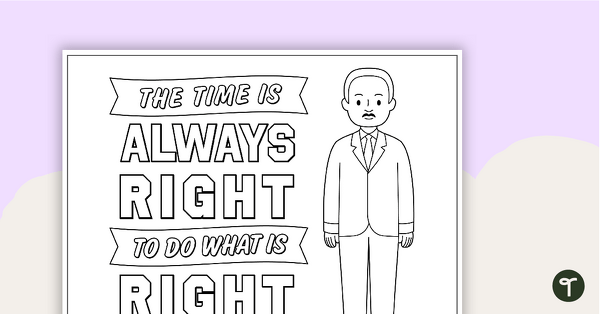
Martin Luther King, Jr. Quote - Coloring Page
Celebrate MLK Day in the classroom and engage your students in thoughtful discussion with a Martin Luther King, Jr. Quote Coloring Page!
- Free Plan
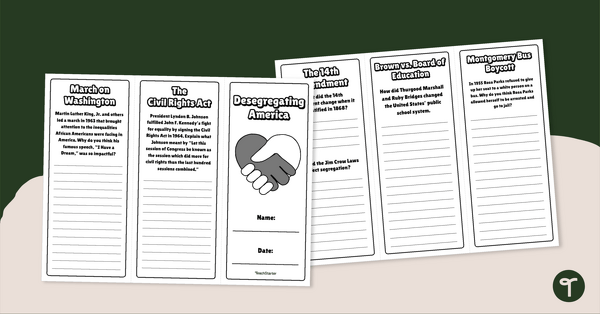
The Civil Rights Movement and Segregation in America Brochure
Demonstrate learning about the major events and leaders who helped end segregation in the United States during the Civil Rights Movement with a brochure project.
- Plus Plan
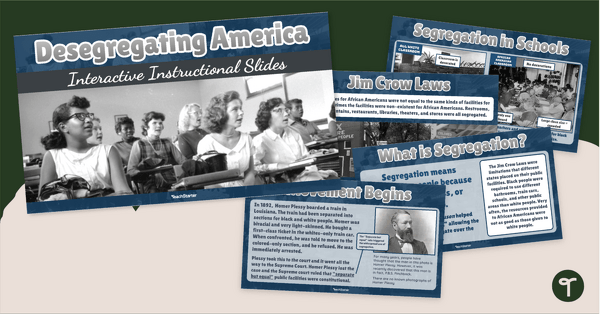
Segregation and the Civil Rights Movement Instructional Slide Deck
Travel into the past and take your students along to discover the long road to the desegregation of schools in the United States.
- Plus Plan
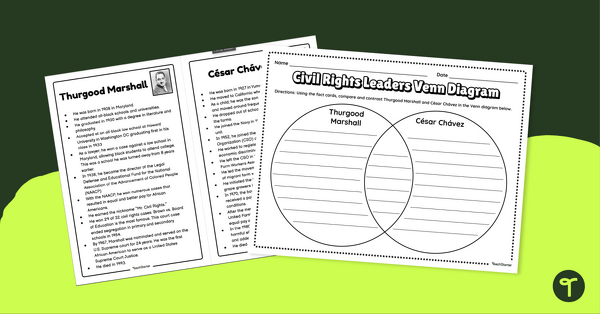
Human Rights Heroes - Marshall and Chavez Venn Diagram
Compare and contrast civil rights heroes with a set of compare-and-contrast Venn diagrams for kids.
- Plus Plan
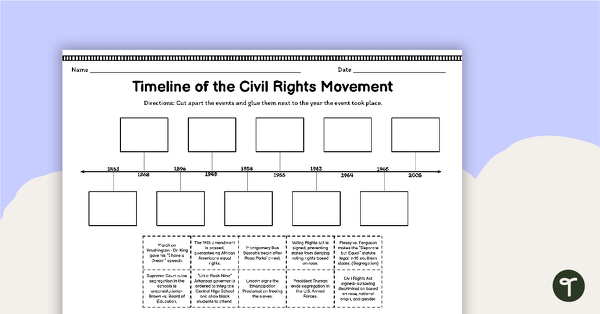
Timeline of the Civil Rights Movement Worksheet
Craft an chronological timeline for students to visually model the events occurring during the Civil Rights Movement.
- Plus Plan
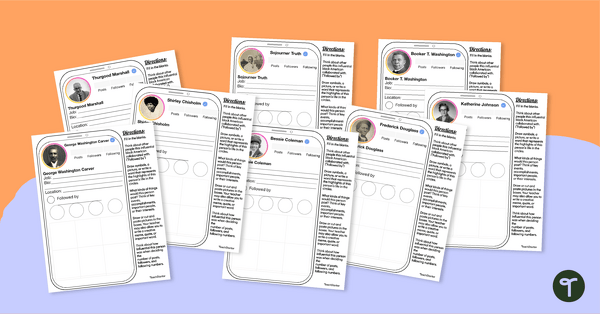
Influential Black Leaders InstaFan Profile Template
Demonstrate learning about the most influential black leaders in history with an engaging social media biography template.
- Plus Plan
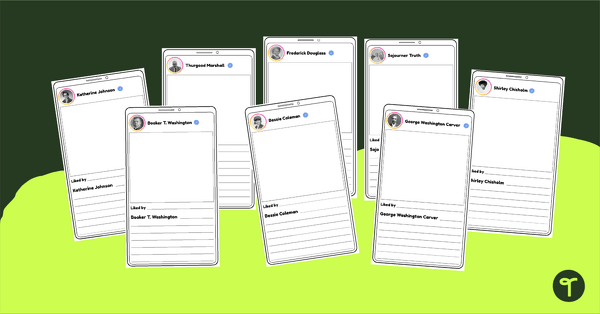
Influential Black Leaders - Instagram Post Template
Demonstrate learning about the most influential Black leaders in history with an engaging social media template.
- Plus Plan
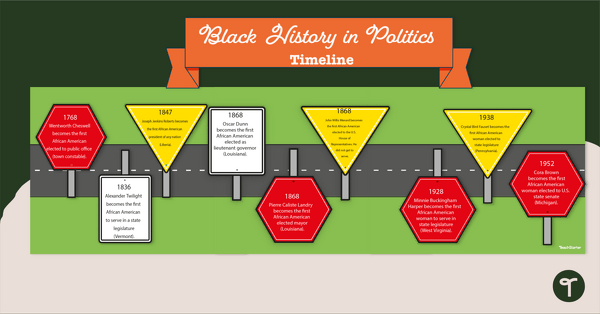
Black History in Politics Timeline
Craft an illustrated timeline for students to explore politically significant moments of the last 3 centuries.
- Plus Plan
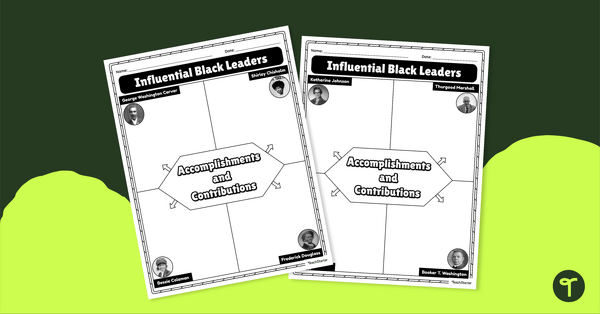
Influential Black Leaders Research Organizers
Dive into a research project on influential Black leaders with a set of Historical Figure graphic organizers.
- Plus Plan
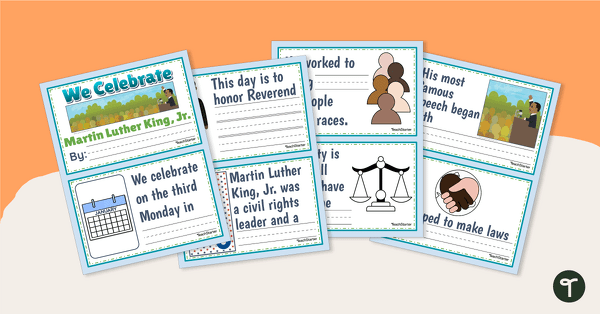
Martin Luther King, Jr. Mini Book
Learn about Martin Luther King, Jr. with a printable book for kindergarten and first-grade students.
- Plus Plan
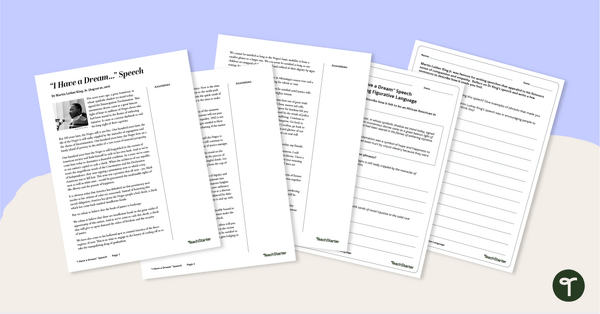
I Have a Dream - Speech Analysis Activity
Review MLK's "I Have a Dream" speech text and explore the metaphors he used to convey his message through the accompanying questions.
- Plus Plan
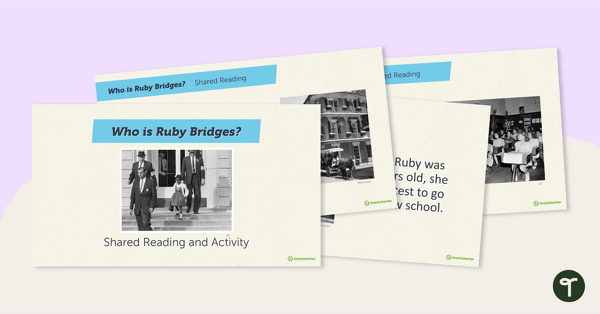
Who Is Ruby Bridges? – Shared Reading and Activity
Read along to learn about Ruby Bridges and her role in desegregation with this 14-slide PowerPoint presentation.
- Plus Plan
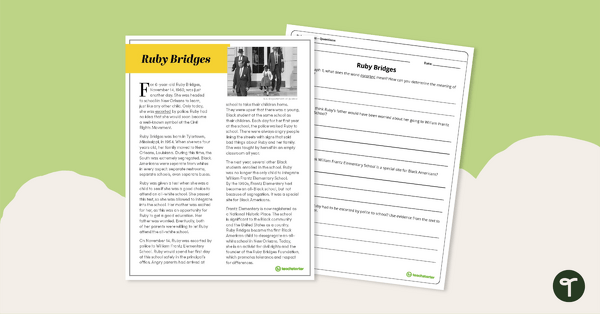
Ruby Bridges – Comprehension Task
Review our profile on 6-year-old civil rights figure Ruby Bridges, and answer questions to reinforce understanding.
- Plus Plan
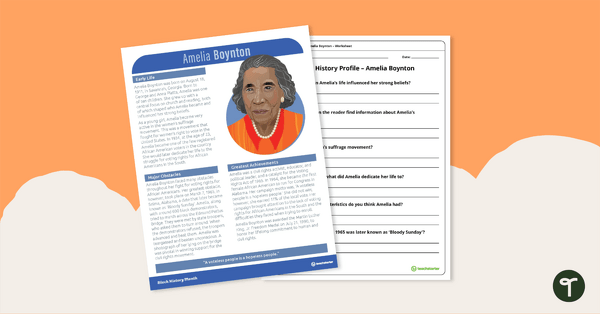
Black History Profile: Amelia Boynton - Comprehension Worksheet
Review our profile on civil rights activist Amelia Boynton and answer questions to reinforce understanding.
- Plus Plan
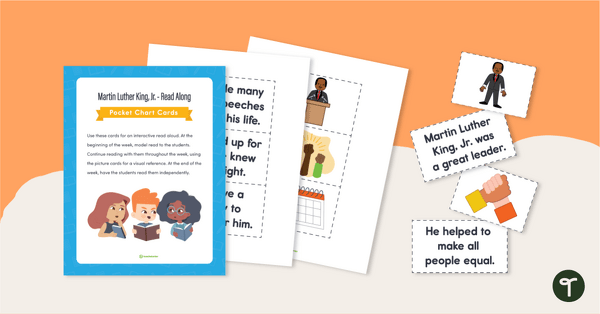
Read Along Pocket Chart Cards - Martin Luther King, Jr.
Use this set of 12 MLK text and image pocket chart cards for reading and sight word practice.
- Plus Plan
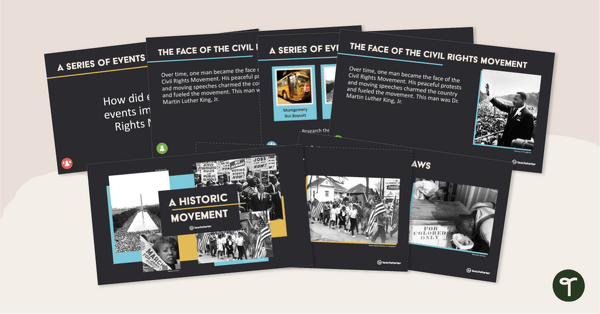
A Historic Movement – Teaching Presentation
Introduce students to the people and events of the American civil rights movement with this 17-slide PowerPoint presentation.
- Plus Plan
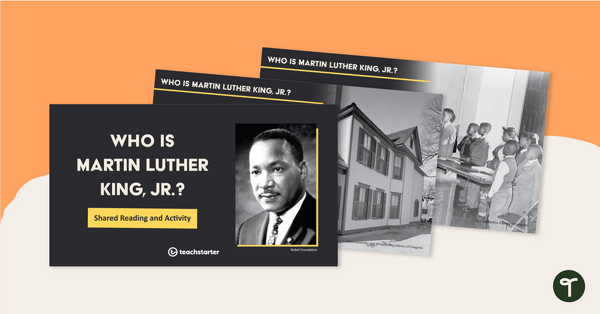
Who Is Martin Luther King, Jr? - Shared Reading and Activity
Use this 13-slide PowerPoint as a collaborative reading exercise about Martin Luther King, Jr.
- Plus Plan
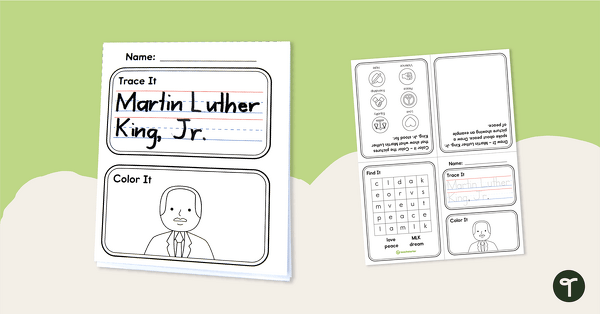
My Little MLK Activity Book
Teach about Martin Luther King, Jr. with 5 mini activities for kindergarten and 1st grade. This printable mini book is teacher-created to bring MLK to life for your students!
- Plus Plan
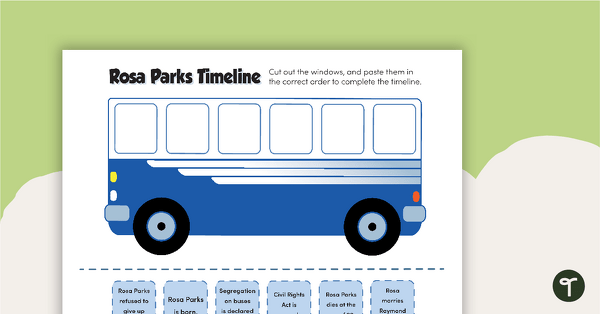
Rosa Parks Timeline Activity
Craft an illustrated timeline for students to visually explore 6 events in Rosa Parks’s life.
- Plus Plan
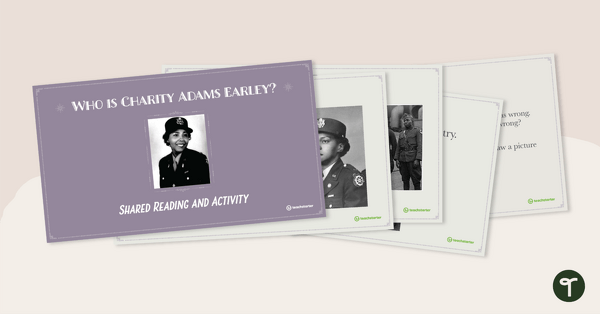
Who Is Charity Adams Earley? – Shared Reading and Activity
Read along to learn about soldier & activist Charity Adams Earley with this 13-slide PowerPoint presentation.
- Plus Plan
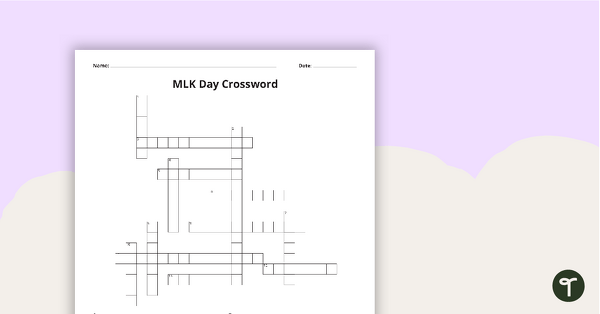
MLK Day Crossword
Identify and write vocabulary words relating to civil rights leader Martin Luther King, Jr. in our MLK crossword puzzle.